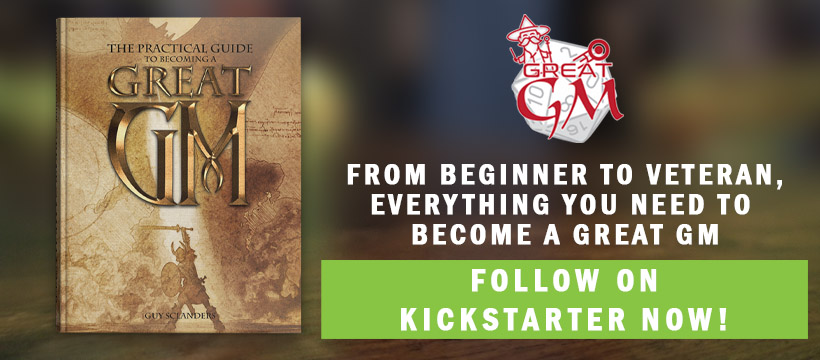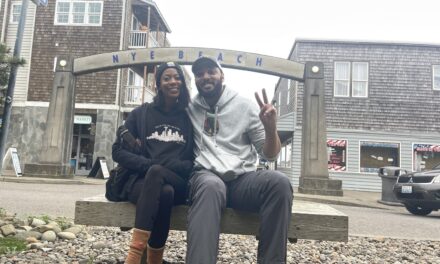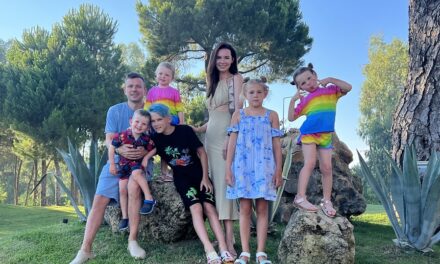Entrepreneur: Guy Sclanders
Biz: Geeks Table (How to Be a Great GM and Tabletop Wizard)
Tilt: Storytelling advice for role-playing games
Primary Channel: YouTube (211K)
Other Channels: Patreon (312), Twitter (8.3K), Discord (6.8K), Facebook (4.3K)
Time to First Dollar: One year
Rev Streams: YouTube, Patreon, books, ebooks, Kickstarter
Our Favorite Actionable Advice
- Assess your strengths: Guy and his business partner took Enneagram personality tests to help determine each person’s role in the RPG content business.
- Don’t see dollar signs: When they launched the RPG content business, they took the lowest salary possible for their basic needs. Pull the minimum amount you need to live from the business in the beginning.
- Acquire social media handles ASAP: They learned the hard way, but you don’t have to. When you have a business brand, ensure the same name is available across social media and domains (and acquire them.)
The Story
Over a decade ago, Guy Sclanders entered the world of competitive game mastering for tabletop role-playing games (RPGs) like Dungeons and Dragons. After winning several competitions, Guy decided to share his storytelling wisdom with fellow gamers. Soon the How to Become Great Game Master YouTube channel was born, and along with it a RPG content business.
At the time, Guy also found himself in an ill-fitting job and wondered if he could seize the opportunity to pursue a career he was interested in. Tabletop role-playing games had always been a fascinating subject for him. “You are creating memories that would not normally exist. You’re creating something out of nothing. And that something will be with you for the rest of your life, even though it is completely made up,” he explains.
So Guy and his business partner, Derrick Greyvensteyn, looked into making a RPG content business out of the channel. Despite the initial low income and financial risk, Guy made a career out of his passion for storytelling.
Host of YouTube’s @HowtoGM accepted the initial low income and financial risk to make a career out of his passion for role-playing game #storytelling. #ContentEntrepreneur #RPG Share on XImmediately, Guy and Derrick Greyvensteyn demonstrated a carefully deliberate approach to growing the business. “We didn’t go out and suddenly buy fancy cars and that sort of thing. It was a case of, ‘Here is your salary, and it is the lowest that we can sort of make it without you living in a cardboard box.'” The rest went into investments and the business.
In addition, they analyzed each of their skillsets, even going so far as to take the Enneagram personality test to determine their roles in the business. As a creative type 7 (aka visionary), Guy concluded that his best option to build their company was to begin writing books. His first book of tabletop role-playing advice, The Complete Guide to Creating Epic Campaigns, was written in a couple of months and remains their bestselling book. Meanwhile, Derrick handles more of the financial and practical aspects of the RPG content business.
@HowtoGM partners took an #Enneagram personality test to determine their roles in their #contentbusiness. #startup #creatoreconomy Share on XGuy earns a comfortable income from writing and talking about his passion. Their YouTube channel now has over 200K subscribers. Unlike most other tabletop RPG channels that focus on player tricks and statistical tips, How to Be a Great GM focuses on storytelling advice and narrative construction.
“We mandated ourselves as our goal as a company is to … educate and inspire,” Guy explains, noting he stays true to his content tilt – sharing advice on how to create conflict and form a character.
Advice for content entrepreneurs
While growing their brand, Guy and Derrick gained several insights, including the need to diversify income, not dilute your brand, and associate with reliable partners.
Develop mutliple revenue streams
When Guy took the risk to create content as his full-time job, he and Derrick quickly realized that they had to start earning income from different sources. Finding new revenue streams helped them earn more money, but it was also essential to creating financial stability.
Multiple revenue sources prevent a content entrepreneur from ceasing operations if one revenue stream ceases to exist. Or as Guy puts it, “What if tomorrow YouTube is shut down? And you go, ‘Well, YouTube can’t possibly shut down. It’s impossible.’ Sure. There are so many little social media platforms that have risen up and died. It can happen.”
"What if tomorrow YouTube is shut down," asks Guy Sclanders of @HowtoGM. That's why multiple revenue sources are essential for #contententrepreneurs. Share on XGrab your social handles and domain names
Guy’s second piece of advice was gained through experience. Though the company began with How to Become a Great Game Master on YouTube. The channel title quickly proved too long for websites and other social media platforms. Their company had to build a brand under several different names. On Twitter, it’s That’s How to GM. On Discord, it’s GreatGM. On Patreon, it’s GreatGameMaster. The confusion created was exasperated by the fact that the company traded under another related, but different name.
Guy says all this chaos makes it difficult for the audience to connect with the brand, and by extension, difficult to support the brand.
He recommends other content entrepreneurs do it differently: “If you are going to start and you have even the smallest little dream of becoming somewhat of a success in the space that you’re jumping into, get every single social media handle you can possibly get.”
Starting a content brand? Make sure to acquire the social media handles and domain names so they're the same, advises @HowtoGM. #contentbusiness #creatoreconomy Share on XConnect with others who you can trust
In partnering with other brands or entrepreneurs, Guy says: “You want to make sure that you link your brand to products and to companies that you can really trust and rely on.” Working closely with other companies can lend mutual credibility and help support smaller growing businesses.
However, these business pointers are not the most important idea to keep in mind when starting your own content business. As Guy says: “You have to do what you love doing. I know that’s an old answer, but it’s so, so true. And you have to have someone with you, whether it’s your business partner or not, who is there and who believes in you.”
About the author
Leo Bonacci writes, proofreads, and edits for The Tilt. A student of Hobart and William Smith Colleges, he’s a fan of classical mythology as well as the English language. Leo’s interest in storytelling extends to his great enjoyment of movies and film, from low-budget schlockfests to cinematic masterpieces.









